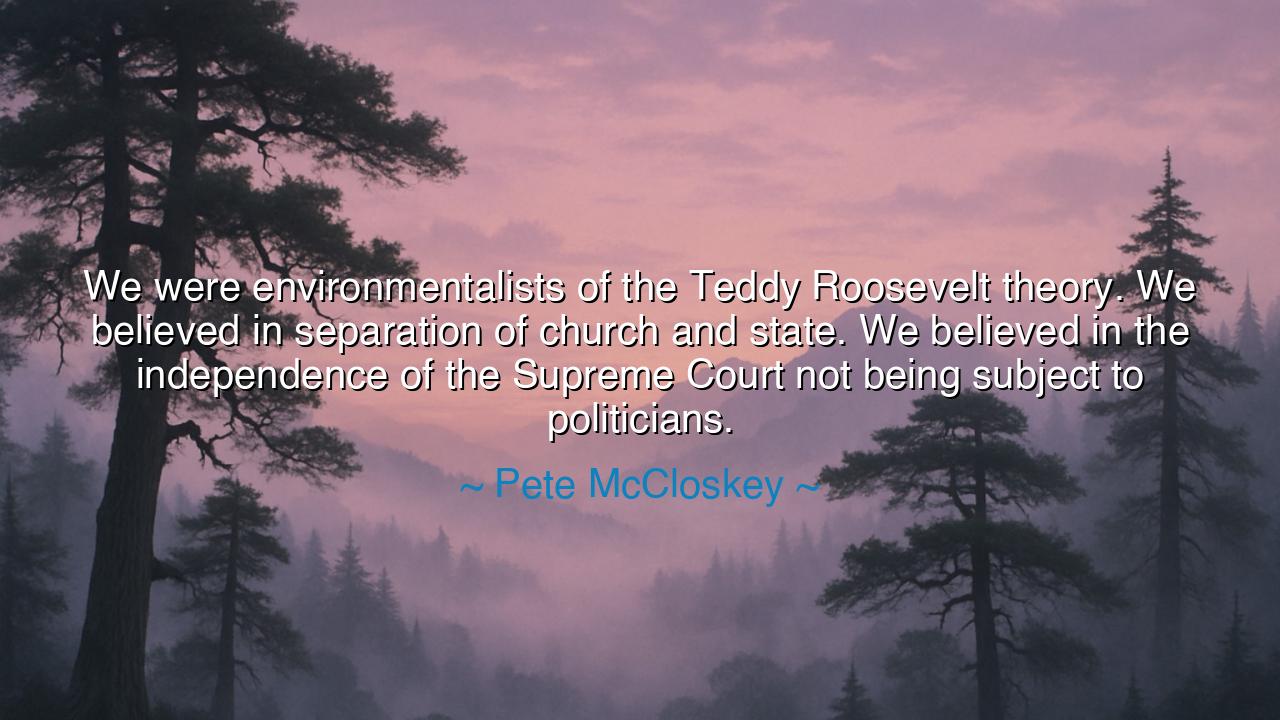
We were environmentalists of the Teddy Roosevelt theory. We
We were environmentalists of the Teddy Roosevelt theory. We believed in separation of church and state. We believed in the independence of the Supreme Court not being subject to politicians.






“We were environmentalists of the Teddy Roosevelt theory. We believed in separation of church and state. We believed in the independence of the Supreme Court not being subject to politicians.” Thus spoke Pete McCloskey, soldier, statesman, and defender of the Earth, reflecting on a time when principle guided politics and the ideals of public service still held their sacred fire. In these words, he reaches across generations to remind us of the true foundations of a republic — not of wealth or power, but of balance, independence, and integrity. His quote, though simple in form, contains the wisdom of an entire age: that the health of a nation lies in the courage of its leaders to defend both the land that sustains them and the laws that bind them to justice.
The origin of this quote comes from McCloskey’s reflections on his time as a congressman during the late twentieth century — a period of moral turbulence and environmental awakening in the United States. A decorated veteran of the Korean War and co-founder of the first Earth Day, McCloskey was among those rare figures who saw no contradiction between patriotism and preservation. When he invoked the “Teddy Roosevelt theory,” he harkened back to the vision of President Theodore Roosevelt, the great conservationist who believed that the glory of America lay not only in its industries and cities but in its wild, untamed beauty — its forests, mountains, and rivers. To preserve those treasures, Roosevelt waged battle against greed, corruption, and the unchecked appetites of the powerful. McCloskey saw himself — and his generation of idealists — as heirs to that same crusade: defenders of both nature and the moral architecture of democracy.
When McCloskey speaks of separation of church and state, he touches one of the oldest pillars of American liberty. The founders, mindful of the persecutions of the Old World, decreed that no faith should rule over the conscience of another. They understood that the soul of a person belongs to God, but the laws of a nation must belong to all. McCloskey, standing in the tradition of those early guardians of freedom, feared that the blurring of this sacred line would weaken the republic, turning faith — which should unite the spirit — into a weapon of division. To him, true faith was not imposed by law but chosen by heart; true government did not command belief, but protected the right to believe freely.
And when he speaks of the independence of the Supreme Court, McCloskey evokes another cornerstone of democracy — the ideal that justice must stand apart from politics. The founders, in their wisdom, created the Court as a temple of law, where the Constitution would reign above ambition, and reason above rhetoric. McCloskey’s lament suggests that in his time, and perhaps even more so in ours, that sacred independence was threatened by partisanship. He reminds us that a nation is not truly free if its judges bow to the favor of rulers or the fury of mobs. Like the ancient philosophers who spoke of justice as the highest virtue of the state, he knew that once the courts become political tools, truth itself begins to decay.
In invoking Teddy Roosevelt, McCloskey does more than praise a president — he resurrects a spirit. Roosevelt was a man who rode into the wilderness to preserve what could not be replaced, who fought monopolies that sought to own the people’s land, and who believed that the duty of government was not to exploit, but to safeguard. His legacy lives not only in the parks and preserves he created, but in the principle that power must serve the public good. McCloskey and his peers saw themselves as disciples of that creed, standing for environmental stewardship, moral restraint, and civic independence at a time when those values were under siege by greed and division.
In this sense, McCloskey’s words are not nostalgia, but prophecy. He warns that when a nation forgets the harmony between its land, its laws, and its liberty, it begins to lose its soul. To poison the earth is to poison the people; to corrupt the courts is to erode justice; to entwine faith and politics is to endanger both. His quote calls us to remember that the preservation of democracy and the preservation of nature are one and the same struggle — both demand humility before something greater than ourselves.
Let this, then, be the lesson drawn from McCloskey’s reflection: that the pillars of freedom — independence, balance, and integrity — must be tended like the forests Roosevelt once sought to protect. A nation that does not guard its moral and natural resources will soon find both exhausted. To live by the Teddy Roosevelt theory is to live with courage — to speak truth to power, to honor creation, and to defend the institutions that keep liberty alive.
So, my listener, remember this: the strength of a republic lies not in its armies or its wealth, but in the purity of its conscience. Be an environmentalist of the spirit — protect the wilderness of the earth, and the wilderness of truth. Guard the independence of your courts, the sanctity of your beliefs, and the freedom of your thoughts. For in that vigilance, you preserve not only your nation, but the very legacy of those who built it — men like McCloskey and Roosevelt, who believed that the greatest power is not to rule, but to protect.






AAdministratorAdministrator
Welcome, honored guests. Please leave a comment, we will respond soon